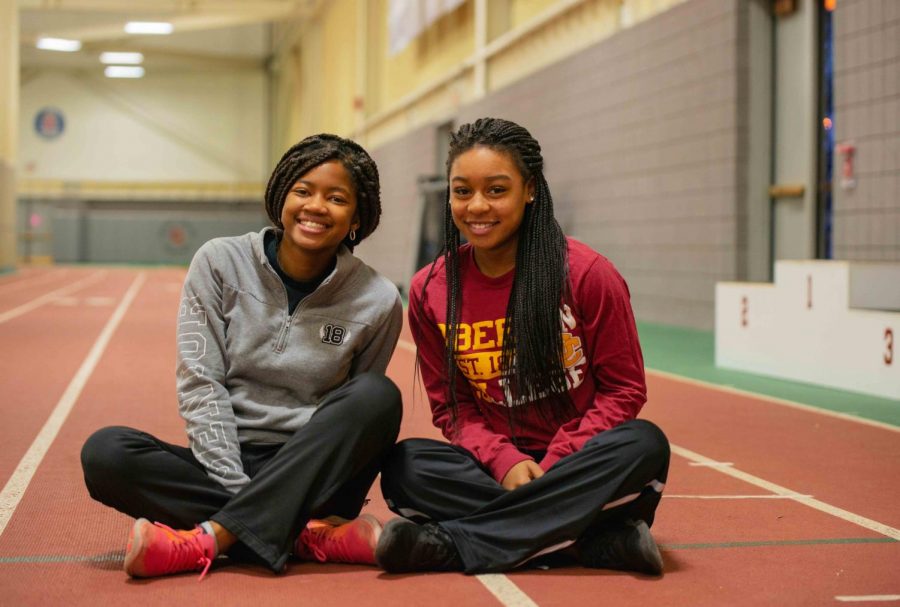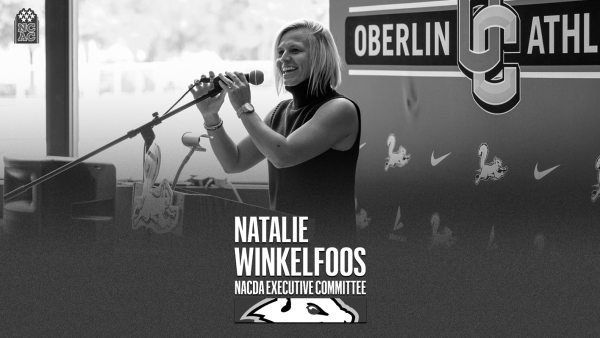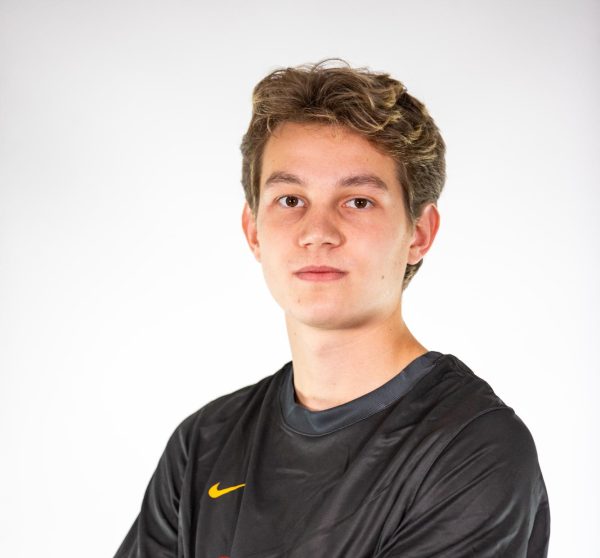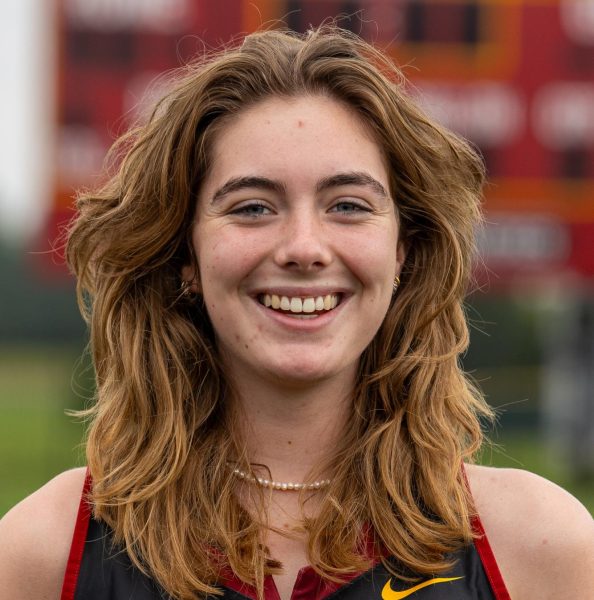In The Locker Room with Malaika Djungu-Sungu and Jada Kennerly, Women’s Track and Field First-Years
Malaika Djungu-Sungu and Jada Kennerly.
Malaika Djungu-Sungu and Jada Kennerly met for the first time as roommates during orientation week this fall. Both first-years, Djungu-Sungu is 17.5 hours away from her home in Arlington, TX, while Kennerly hails from Mt. Vernon, Ohio — a small town similar to Oberlin about an hour and a half away. This weekend, the two will be competing in their first college meet in the sprints and jumps for the women’s track and field team.
This interview has been edited for length and clarity.
What are y’all’s events?
Jada Kennerly: I do short sprints and hurdles. I’ll be running indoor, probably 60 [meter dash], 60 meter hurdles, and very rarely the 200 [meter dash].
Malaika Djungu-Sungu: I do jumps and sprints. For indoor I’ll be doing long and triple [jump], and the sprints part is pretty vague right now; I’m not sure, but probably like the 100, 200. [My coach] was like, “Eventually you’ll get to the 400, but probably not now.”
When did you start participating in track and field?
JK: I went to a private school, so we could start sports in fourth grade, but we couldn’t do hurdles until fifth grade.
MD: I started running in fifth grade. Our elementary school didn’t have track teams. We’d have that little field day thing, but I did track outside. In middle school, I stopped doing that and just joined the school team. Club makes it seem like it was more “for real” — it was like a club, but it wasn’t serious. Some fifth graders [are] real serious — they’re built with muscle and everything already.
Why did you decide to continue doing track in college?
JK: I did it because without sports, I’d be a hot mess. I feel like it helps me manage my time — I have to go to practice at a certain time, so I have to do stuff at this time. Also, I was very nervous about making friends in college, and I was like, “If I’m on a team, these people have to like me.” And also we were both recruited.
MD: Yeah, we were recruited. And then I gave up trying to be an Olympian in [around] eighth grade. So track was always something [where] I enjoyed myself but still kind of took it seriously, but not really. And then having some people who made you feel part of a group. I love track and wanted to do it for four more years and see what I could become.
Why did you decide to do track at Oberlin and not another college?
JK: The recruiting process here was just so much better than other places. [Recruiting Coordinator and Associate Head Track and Field] Coach [John] Hepp called me every day. The women coming off of such great wins helped as well, because you want to join a good team. You know if you go somewhere else and you’re a first-year, you might not even get to run or score points or anything like that, so having that reassurance was nice. And then coming here, meeting the team and feeling welcomed and fitting in was nice. So I was like, “Hey, this is a good place.”
MD: Yeah, the recruiting process was a big thing. You’re recruited by other schools and everything, but Oberlin stood out. And it was because someone actually — and maybe he was kidding or faking — showing that they want you there and that you’re valuable to them. Also, I didn’t want to make a decision on a school based on the track side, because that’s not what I wanted to do for the rest of my time. I chose to run here because I chose Oberlin as a whole. At first when you’re [being] recruited, there’s always a stigma when people are like, “DIII schools” or whatever, but I like that you’re able to balance your academic life, which is important, and still be an athlete at the same time — and then still be a scholar. Other athletes that are DI kind of pass their classes, but sports take over their life, and I didn’t want that for myself.
Have you ever competed indoor? Will this be your first indoor meet?
JK: My high school didn’t do indoor meets, but senior year after I basically knew I was going to come here, I entered two indoor meets just to get a feel for it. They went horribly. I got so much anxiety because I was by myself and I don’t do well with new situations. It was just really bad. So this will be my first indoor meet with a team [and] hopefully will be a more positive experience.
MD: I’ve never done indoor before, being from Texas. That’s also something to get used to, running in a different weather whenever we start outdoor. It’ll be interesting.
What are y’all not looking forward to about indoor?
JK: Staying so long because both of our events are early.
MD: I feel like the different track affecting my performance. A 200 [meter race] is a full lap.
What are you looking forward to?
JK: 60 meter hurdles. I’ve never done done that before, so it’ll be interesting. I used to four-step in high school and now I have to three-step. I’m nervous, but I feel like it’s better to start indoor just because it is shorter so I can build up my strength for outdoor.
MD: I’m looking forward to jumping, specifically long-jumping. Learning better technique and feeling stronger.
What differences have you seen so far in your high school practices and your current college practice regimen?
JK: We lift so much more. In high school we used to lift but it was like, “Use a dumbell … and do some stuff by yourself,” but now it’s real stuff and we deadlift and do heavy lifting. We’re taught how to do it, so that’s different.
MD: Lifting is serious now. In high school — I’m 5’3” — and they’re like, “OK, don’t put any weight on your bench press because you can’t do that.” They don’t teach you about proper weight, this many reps mean this, this many reps means strength endurance, if you do an exercise wrong you could hurt yourself seriously. Here, the team dynamic is a lot different. There’s people who are actually supporting you. In track it’s really easy to become like “I’m on a team, but this is an individual kind of thing.” I don’t feel that as much here. I also feel like I know more about what I’m doing and how it’s helping me.
JK: Yeah, I feel like I’m being coached way more. Obviously I had a coach in high school, but it was always like, “Oh so you kind of know how to run, so I’m not going to help you, I’m going to help the other kids.” But here you get attention. You want to ask a question, you can ask. If you’re doing something wrong, they’re going to tell you how to change it.
What are your goals for this weekend and more generally this season?
JK: For this weekend I hope to three-step over all my hurdles. For the season, I just really hope to actually score points for the team. I don’t want to just be a first-year here running. I want to make a difference right away.
MD: For this meet, I hope to not scratch. At all. That’s my goal. For the season, I hope to PR significantly — not like two or three inches, but at least a foot — and actually be a valuable player.
You two are roommates — how is that also being on the same team?
JK: We walk to practice together, so we’re never late. If one of us is late, we’re both late. Always cheering for each other. It’s fun because sometimes we don’t practice together, so when we see each other, we’ll be like, “That’s my roommate!” We just do dumb stuff like that.
MD: I like it; it’s nice. You would think being around someone for so many hours of the day would be a thing, but I guess it’s just because we have a good thing going that it’s fine. It’s really not a problem. And it’s nice, especially in the beginning when you don’t know anybody, at least we can be [together]. Just having someone where we can hold each other to doing things and having the support inside and outside of track [is nice].










